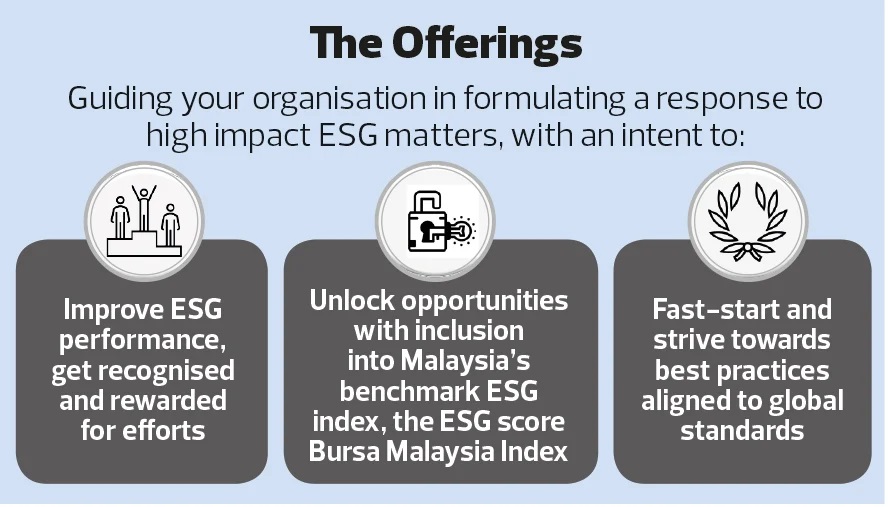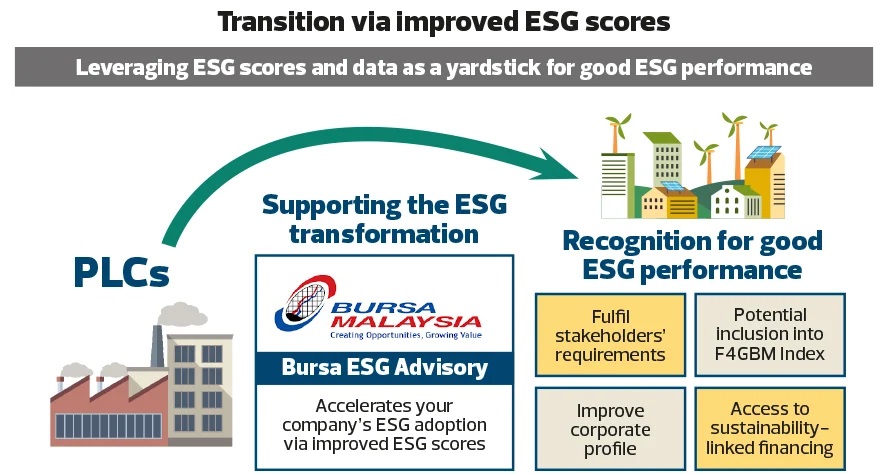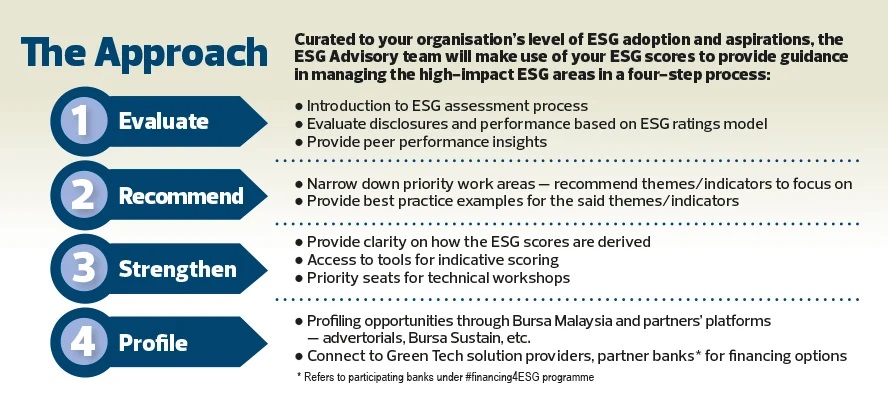
BIX ARTICLE
Bursa Malaysia rolls out ESG Advisory Services
Nov 30, 2022
|
11 min read
Featured Posts
Social Bonds Illustrative Use-Of-Proceeds Case Studies Coronavirus
Jul 06, 2020
|
2 min read
Sustainable Banking Network (SBN) Creating Green Bond Markets
Jul 06, 2020
|
2 min read
Why is Inflation Making a Big Comeback After Being Absent for Decades in the U.S.?
Mar 24, 2022
|
7 min read
SC issues Corporate Governance Strategic Priorities 2021-2023
Mar 29, 2022
|
3 min read
However, the ESG landscape is still in its formation phase, where ESG disclosure standards are yet to be fully established the way IFRS and GAAP are in the financial accounting sphere. This leads to questions constantly being asked by business owners and their management as they navigate the evolving landscape. For instance, what are the material ESG risks that are most relevant to each industry? Which kind of data standards should they adopt and disclose? What are the processes they can put in place to monitor and improve their ESG ratings?

“Business enterprises, particularly the PLCs, are facing increasing pressure to satisfy a myriad of ESG requirements imposed upon them by key stakeholders in their respective ecosystems, from regulators, industry bodies, customers, lenders, investors and other stakeholders,” said Wong Chiun Chiek, Senior Executive Vice-President, Data, Index & ESG Business of Bursa Malaysia.
“From our observations, many large companies are well-equipped in their journey to transition to a greener future, but there is a need for greater support for small- to mid-sized companies, especially those that are import-export-driven, or those who do not have fast access to expertise — such as those not located in central business districts.”
In general, most business owners and CEOs have already started the ESG journey for their enterprises, albeit at different stages of progress. The challenge is really the race against time. For example, South China Morning Post recently reported that the European Union will require manufacturers in China and elsewhere in Asia to furnish carbon emissions data to EU customers from 2023 onwards, starting with those that operate in the cement, aluminium, fertilisers, steel, and electricity industries. Closer to home, sustainability-related disclosures for PLCs will be made mandatory starting from the annual reporting cycle ending 2023.
However, assembling an in-house ESG team takes time. Demand for good talent is on the rise but supply is still relatively low. This is an urgent issue that needs to be resolved, as PLCs are increasingly being asked by banks for their company’s ESG credentials when raising capital. Institutional investors, both foreign and domestic, are also adding ESG parameters in their investment decision-making, which has a direct impact on PLCs’ fundraising considerations.
Another global development is that large companies operating in sectors with higher ESG scrutiny, such as energy and utilities, are now adding ESG considerations in their supply-chain management. Suppliers of their projects will need to be screened for their green credentials.

“To allow the economy to transition to green in an open, transparent, and cost-efficient manner, data is an enabler,” said Wong. “Robust public disclosures on ESG parameters is a good mechanism to keep companies honest.”
While there are other existing services out there, PLCs can opt for Bursa Malaysia’s ESG Advisory Services for practical, workable and reliable recommendations to enhance their sustainability policies and practices. Referring to the methodology that underpins the FTSE4Good Bursa Malaysia (F4GBM) Index, Bursa Malaysia will use this methodology as a transitional platform to put PLCs on a solid footing by identifying ESG risks to improve their disclosure and standards.
The advisory services, which commenced operating in July this year, was designed with the intention to help small- and medium-sized PLCs improve their ESG disclosures and credentials by leveraging internationally recognised standards and peer-learning of best practices from industry leaders, along with clear value propositions to enhance the PLCs’ investability to institutional investors.
In addition, PLCs would have access to green financing options via the #financing4ESG programme. Bursa Malaysia has partnered with four banks, namely CIMB Bank Bhd, OCBC Bank (Malaysia) Bhd, HSBC Amanah Malaysia Bhd and Alliance Bank Malaysia Bhd, who offer sustainable financing options to PLCs in alignment with the F4GBM rating models.
In terms of awareness and adoption of best-in-class ESG disclosure practices, there is a big divide between established companies well-invested in sustainability practitioners and resources, and those who are just setting out to do so. Hence, there is an urgent need to close the gap between the “haves” and “have-nots” in a cost-efficient way, and to cast the net as wide as possible.
Observed Wong, “Think of it this way, your ESG credentials will be as important as your credit-worthiness. So, start young, nurture and grow over time, as ESG is likely to be used in the same way as assessing one’s credit scores.”

Identify material ESG risks and a high impact value proposition
Bursa Malaysia ESG Advisory Services can help PLCs identify material ESG risks and recommend solutions. The ESG Advisory Services can help kickstart companies to pick the low-hanging fruits, so that they can deliver quick results to show that this is a path worth taking.
The process is simple: first, the ESG Advisory Services team would engage and introduce PLCs to the rating models and assessment of a sustainability index. Then, the process would narrow down into specific high impact areas where detailed ESG indicators are provided for the PLCs to monitor and focus on. In addition, industry best practices that could help improve those indicators would be shared.
“On top of performing in-depth research and analysis specific to the company disclosures, we would consult the PLCs in terms of where they currently are, and where they may aspire to be within their peer group,” commented Wong.
To monitor and measure progress, digital toolkits have been developed to help PLCs simulate impact-sizing as well as potential indicative scoring, which will be aligned to the business plans.
To further strengthen in-house ESG knowledge and awareness, technical workshops may be organised for participating PLCs. Other benefits of working with Bursa Malaysia’s ESG Advisory Services would include profiling opportunities through Bursa Malaysia’s or its partners’ platforms once meaningful results or innovative collaborations are achieved.
An experienced player in the field
With eight years of experience in managing the rating models of a sustainability index, as well as consulting with more than 200 PLCs on ESG-related assessments, Bursa Malaysia can help PLCs in their ESG transformation journey.
Wong concluded, “The ESG Advisory Services has been designed to achieve specific purposes, which is to focus on improving disclosures in a quantifiable way using credible standards.”
The launch of the ESG Advisory Services has been well received by PLCs, since its launch in July this year, spanning various sectors. It has provided PLCs with greater knowledge and appreciation pertaining to sustainability matters, while providing new perspectives and ideas on how they could further improve their business operations while making a positive impact on the world.
Companies interested to find out more about Bursa Malaysia’s ESG Advisory Services can contact our Index & Sustainable Business team at [email protected].

Source: Bursa Malaysia rolls out ESG Advisory Services (2022, 28 November). theedgemarkets.com. Retrieved from https://www.theedgemarkets.com/content/advertise/bursa-malaysia-rolls-out-esg-advisory-services
Disclaimer
The information provided in this report is of a general nature and has been prepared for information purposes only. It is not intended to constitute research or as advice for any investor. The information in this report is not and should not be construed or considered as an offer, recommendation or solicitation for investments. Investors are advised to make their own independent evaluation of the information contained in this report, consider their own individual investment objectives, financial situation and particular needs and should seek appropriate personalised financial advice from a qualified professional to suit individual circumstances and risk profile.
The information contained in this report is prepared from data believed to be correct and reliable at the time of issuance of this report. While every effort is made to ensure the information is up-to-date and correct, Bond and Sukuk Information Platform Sdn Bhd (“the Company”) does not make any guarantee, representation or warranty, express or implied, as to the adequacy, accuracy, completeness, reliability or fairness of any such information contained in this report and accordingly, neither the Company nor any of its affiliates nor its related persons shall not be liable in any manner whatsoever for any consequences (including but not limited to any direct, indirect or consequential losses, loss of profits and damages) of any reliance thereon or usage thereof.
YOU MAY ALSO LIKE
ARTICLE
Feb 13, 2026
|
4 min read
ARTICLE
Sep 29, 2025
|
6 min read
ARTICLE
Aug 12, 2025
|
6 min read
ARTICLE
Jul 29, 2025
|
3 min read





